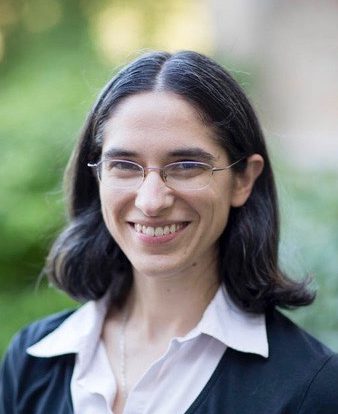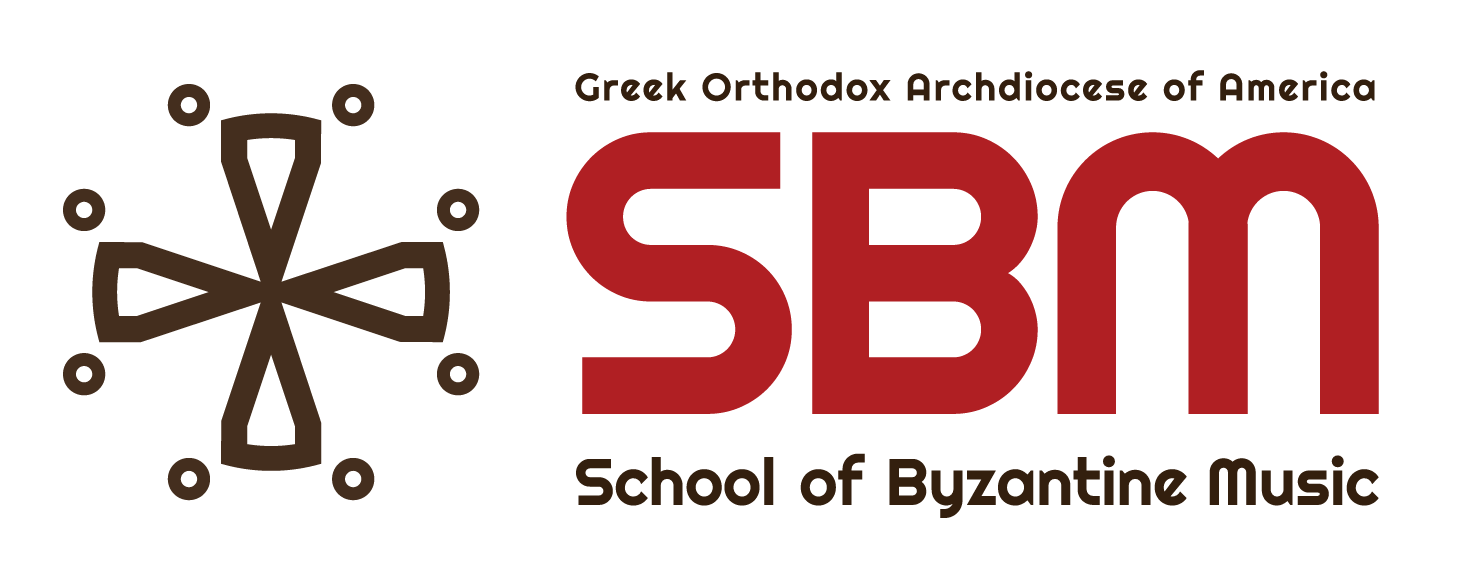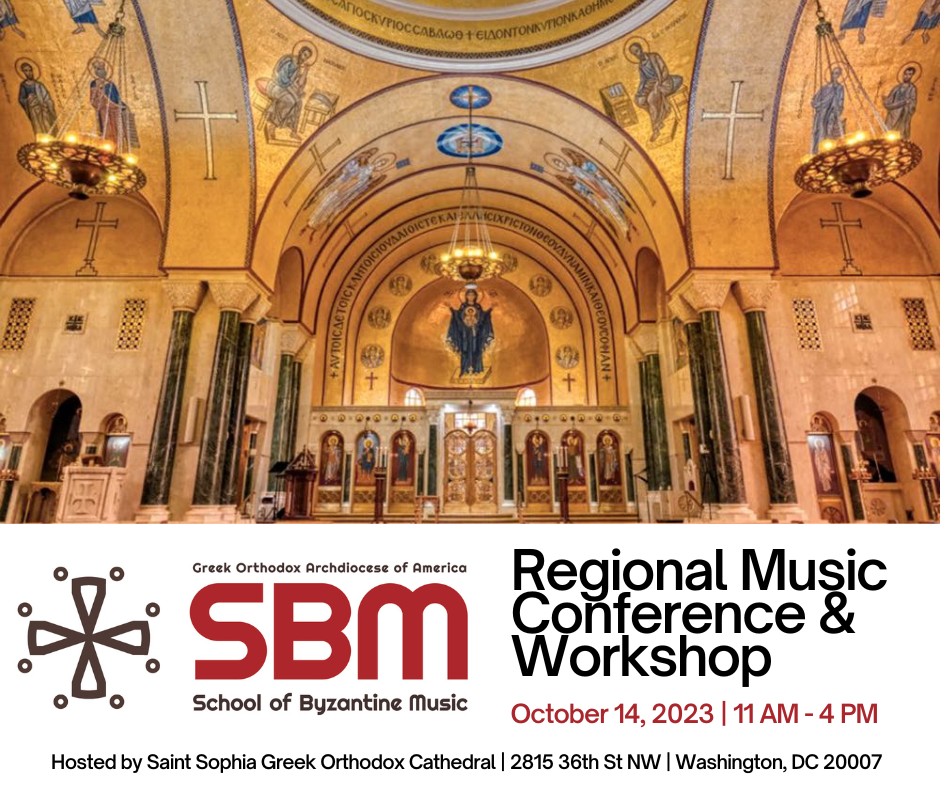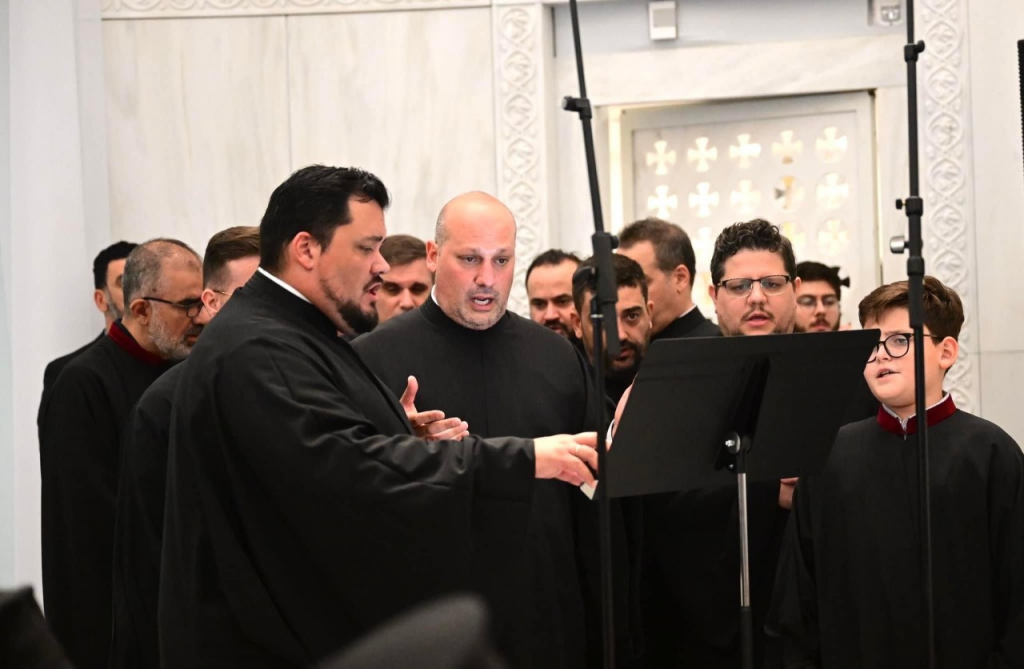The Archdiocesan Byzantine Choir was honored to perform at the Centennial Reception of the 46th Biennial Clergy-Laity Congress in New York. The event was held at the Metropolitan Museum of Art and was also part of the Centennial Celebration of the Greek Orthodox Archdiocese of America.
This unique concert was the result of extensive collaboration between the Archdiocesan Byzantine Choir and the National Forum of Greek Orthodox Church Musicians. The conductors of each choir worked together to develop a music program that would showcase the repertoire of each choir individually. For the finale, the choirs were combined to perform The Great Doxology (Grave Mode enharmonic) and The Great Prokeimenon (Grave Mode enharmonic).
The concert was introduced by the Rev. Fr. Romanos Karanos, Ph.D., Assistant Professor of Byzantine Liturgical Music at Hellenic College Holy Cross Greek Orthodox School of Theology in Brookline, MA. Fr. Romanos provided a brief overview of Ecclesiastical Music in the Greek Orthodox Archdiocese of America over its 100-year history and noted that the Ecclesiastical Music of today has its origins dating back to the first millennium.
At the conclusion of the program, His Eminence Archbishop Elpidophoros recognized Georgios Theodoridis, Conductor of the Archdiocesan Byzantine Choir, as a “Centennial Honoree” for his tireless work as the Director of the Archdiocesan School of Byzantine Music and his devotion to the Psaltic Art.
The pieces performed by the Archdiocesan Byzantine Choir are listed below:
- Gladsome Light, Mode 2nd
- I Will Come Into Your House, Mode pl. 4th
- Prokeimenon on Wednesdays, Mode pl. 1st
- A Good Word with kratema, Mode 4th aghia
- It is Truly Right, Constantinopolitan, Mode pl. 1st
- I Will Love You, O Lord, Mode 2nd
- I Will Bless the Lord with kratema, Mode pl. 1st
- Lord, Have Mercy, “Pentaehon” (in five Modes)
The Archdiocesan Byzantine Choir would like to acknowledge and thank its participants from the Centennial Concert (roster listed below). The choir was directed by Georgios Theodoridis, Archon Music Instructor of the Greek Orthodox Archdiocese of America and Director of the Archdiocesan School of Byzantine Music.
Archdiocesan Byzantine Choir Roster for the Centennial Concert, “From Byzantium to America”:
Nektarios Antoniou, Protopsaltis
Archdiocesan Cathedral of the Holy Trinity, New York, NY
John Brakatselos, Psaltis
Church of the Holy Resurrection, Brookville, NY
Theodore Brakatselos, Psaltis
Church of the Holy Resurrection, Brookville NY
Philip Carallo, Protopsaltis
St. Nicholas Greek Orthodox Cathedral, Tarpon Springs, FL
Ian Chambers, Psaltis
Greek Orthodox Church of Our Savior, Rye, NY
Yianni Cote, Psaltis
St. Basil Chapel, Garrison, NY
Antonios Gementzopoulos, Psaltis
St. Theodore Greek Orthodox Church, Lanham, MD
Nick Giannoukakis, Protopsaltis
Metropolis of Pittsburg
Philippos Gurguliatos, Psaltis
Annunciation Cathedral, Boston, MA
Rick Hanson, Psaltis
Holy Trinity Greek Orthodox Church, Fort Wayne, IN
Samuel Herron, Protopsaltis & Choir Director
Assumption Greek Orthodox Church, Scottsdale, AZ
Elias Hilaneh, Psaltis
St. Demetrios Greek Orthodox Church, Tuscon, AZ
Isaac Hilaneh, Psaltis
St. Demetrios Greek Orthodox Church, Tuscon, AZ
Rev. Fr. Andreas Houpos, Proistamenos
St. Nektarios Greek Orthodox Church, Charlotte, NC
Rev. Fr. Romanos Karanos, Proistamenos
Annunciation Greek Orthodox Church, Brockton, MA
Vasileios Karanos, Psaltis
Annunciation Greek Orthodox Church, Brockton, MA
Dimitrios Katsiklis, Protopsaltis
St. Nicholas Greek Orthodox Church & National Shrine, New York, NY
Elias Katsiklis, Psaltis
St.Nicholas Greek Orthodox Church & National Shrine, New York, NY
Rev. Fr. Theofanis Katsiklils, Assistant Priest
St. Nicholas Greek Orthodox Cathedral, Tarpon Springs, FL
Constantine Kokenes, Psaltis
St. Philothea Greek Orthodox Church, Watkinsville, GA
Yianni Mavrogiannis, Psaltis
Greek Orthodox Cathedral of Saint Paul, Hempstead, NY
Spyros Perivolaris, Lampadarios
St. Constantine Greek Orthodox Church, Kolonos, Athens, Greece
George Rallis, Protopsaltis & Choir Director
Holy Trinity Greek Orthodox Church, Asheville, NC
Michael Rallis, Protopsaltis & Choir Director
St. Nicholas Greek Orthodox Church, Wilmington NC
Nicholas Roumas, Psaltis
Sts. Anargyroi Greek Orthodox Church, Marlboro, MA
Rev. Fr. Neofitos Sarigiannis, Proistamenos
St. George Greek Orthodox Church, Schenectady, NY
Michael Sellas, Psaltis
Holy Apostles Orthodox Church, Bowling Green, KY
Aris Spirtos, Protopsaltis
Saints Constantine & Helen Greek Orthodox Church of Washington DC, Silver Spring, MD
Christos Stavropoulos, Protopsaltis
Annunciation Greek Orthodox Church, New York, NY
Georgios Theodoridis, Protopsaltis & Choir Director
Saint Sophia Greek Orthodox Cathedral, Washington, DC
James Tsimis, Psaltis
Greek Orthodox Cathedral of Saint Paul, Hempstead, NY
Ioannis Tziligkakis, Psaltis
Saint John the Baptist Greek Orthodox Church, New York, NY









